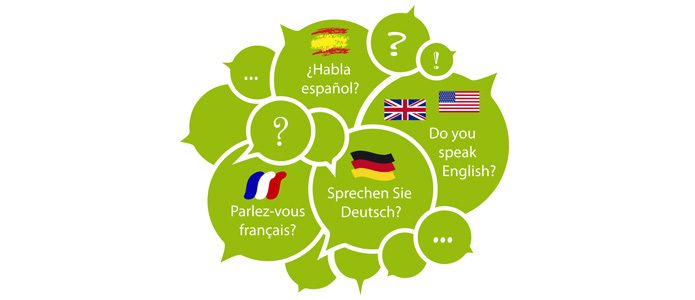Many countries have several official languages, which is not always to the advantage of the political climate. But the citizens, above all, benefit from being multi-lingual.
One country, one language – this is a normal idea for many people in Europe. But in the global context, a single language is the absolute exception: of 195 nations, 163 have two or even three official languages. In the constitution of India 21 languages are regarded as official and regional languages; in Nigeria over 400 languages are used in everyday life. What is more, the European Union (EU) officially recommends that each citizen should master two other languages in addition to his or her mother tongue.
Scientists today assume that man is multi-lingual by nature. According to Jürgen Meisel, linguist at the University of Calgary in Canada, people who grow up with only one language are actually under-challenged. The scientist distinguishes three types of territorial multilingualism: first, multilingual states with a territorial principle, that is to say, countries in which different languages are spoken in different regions, such as Switzerland and Belgium. Then there are multilingual state with individual multilingualism, where people throughout the whole country speak several languages, like in Luxemburg or Namibia. And thirdly, one-language states with minority regions, like Germany or Austria.
Priority given to mutual understanding
A basic features of Switzerland is the juxtaposition of four official languages, German, French, Italian and Rheto-Romance. In a study dated 2014, almost two-thirds of the population claimed to use more than one language regularly. The cohesion of such a multilingual society is dependent on how well the members understand each other despite their linguistic differences. In 2010 a national research programme came to the conclusion that exchange across the internal language borders in Switzerland mainly functions when a common objective or problem has to be dealt with, such as, for example, in communication in the army or the emergency telephone number.
Currently, however, a controversial political debate is in progress in Switzerland as to whether the cantons, which are responsible for education policy, should be obliged to start teaching a second official language in primary school. The Language Bill of 2010 merely ascertains that “at the end of their obligatory schooling pupils (must) have competencies in at least a second official language and a further foreign language”. The main reason for this debate is the ever increasing dominance of English, which is forcing the respective other major Swiss national languages into the background, both at school and in everyday life.
Moreover, an increasing number of Swiss people speak a mother tongue that is not one of the national languages. On the website of the Swiss Federal Chancellery we read that as a consequence of migration, “the traditional four-language state has long since become multilingual”. The dispute, therefore, is how important it is to promote the original language of children with an immigrant background, and what knowledge of the Swiss national languages should be required for authorisations related to aliens law and for Swiss citizenship.
Speaking several languages daily
In Luxembourg, where the three official languages of Luxembourgish, German and French are not ascribed to any particular region, most people speak several languages daily. French and German are obligatory subjects during pupils’ whole school career, while English is added in secondary schools. Like in Switzerland, Luxembourg’s variety of languages presents special challenges for children with immigrant background, which is why children are now obliged to go to school at the age of four instead of five. Early education has also been introduced, though it is not obligatory. Here and in the pupils’ first two years at school, the teachers speak as much Luxembourgish as possible. The development of their linguistic abilities is to be promoted in all children. Since 1983 courses have also been integrated in the children’s mother tongues. Here the children of immigrants can gain a mastery of their mother tongue and so keep contact to their culture of origin.
In Belgium there is an ongoing and politically explosive controversy about equality between the Flemish and French speaking regions. Unlike in Switzerland, the internal borders between languages, member states and economic clout run parallel in Belgium. The linguist Claudia Riehl from the Ludwig Maximilian University in Munich explains that a certain social or cultural group will often use language to assert their politico-economic interests. “National languages and “dominant cultures” serve to constitute people’s national identity”. Riehl says it is a myth that children are over-challenged by several languages. “Every additional language is easier to learn. Anyone who speaks three languages already learns the fourth without difficulty.” Then multilingualism offers not only professional, but also cognitive advantages, up to and including a possible later onset of dementia. And “multilinguists have a more differentiated view of the world. They learn about other ways of seeing things through the ‘eye’ of the other language and are therefore more flexible in their actions.”
